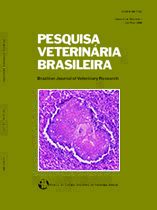 |
|
|
|
Year 2017 - Volume 37, Number 11
|

|
Clinical, endoscopic and histopathological evaluation of dogs with inflammatory bowel disease, 37(11):1287-1291
|
ABSTRACT.- Cascon C.M., Mello M.F.V., Leite J.S. & Ferreira A.M.R. 2017. [Clinical, endoscopic and histopathological evaluation of dogs with inflammatory bowel disease.] Avaliação clínica, endoscópica e histopatológica de cães com doença inflamatória intestinal. Pesquisa Veterinária Brasileira 37(11):1287-1291. Departamento de Patologia e Clínica Veterinária, Faculdade de Veterinária, Universidade Federal Fluminense, Rua Vital Brazil 64, Niterói, RJ 24230-340, Brazil. E-mail: anatopatovet@vm.uff.br
The aim of this study was to evaluate macro and microscopic gastrointestinal mucosa of domiciled dogs, with chronic gastrointestinal symptoms by endoscopy and histopathological evaluation, correlating clinical signs, macro and microscopy characteristics/aspects/changes of duodenal and gastric mucosa. Twenty dogs of different breeds were evaluated with with chronic characteristic signs of Inflammatory Bowel Disease (IBD), being 7 males and 13 females, with ages ranging from 1.7 to 15.8 years old. The study was prospective and cross-sectional, conducted in dogs treated at the Teaching Veterinary Medicine Hospital of the Universidade Federal Fluminense (HUVET-UFF) and private clinics in the city of Rio de Janeiro. Gastroduodenal mucosal samples were obtained by endoscopic biopsy and were processed by routine histological technique and stained with hematoxylin- eosin and Giemsa. The samples were submitted to histopathological analysis for the detection of spiral bacteria suggestive of Helicobacter spp. The rapid urease test was also performed. The clinical signs, the macro and microscopic findings were compared and correlated. In this study, we established a positive correlation between weight loss and the presence of erythema in the antrum, body and duodenum as well as correlation between change in appetite and the presence of gastric inflammatory infiltrate and positivity in the urease test. This study demonstrated the importance of the observation of some clinical signs such as weight loss and appetite changes in the course of IBD. Thus, it is emphasized that dogs showing these clinical signs should have the IBD included in the differential diagnoses group avoiding thereby neglecting a disease that increasingly affects small animals. |
| |
|
|
| |
|
 |